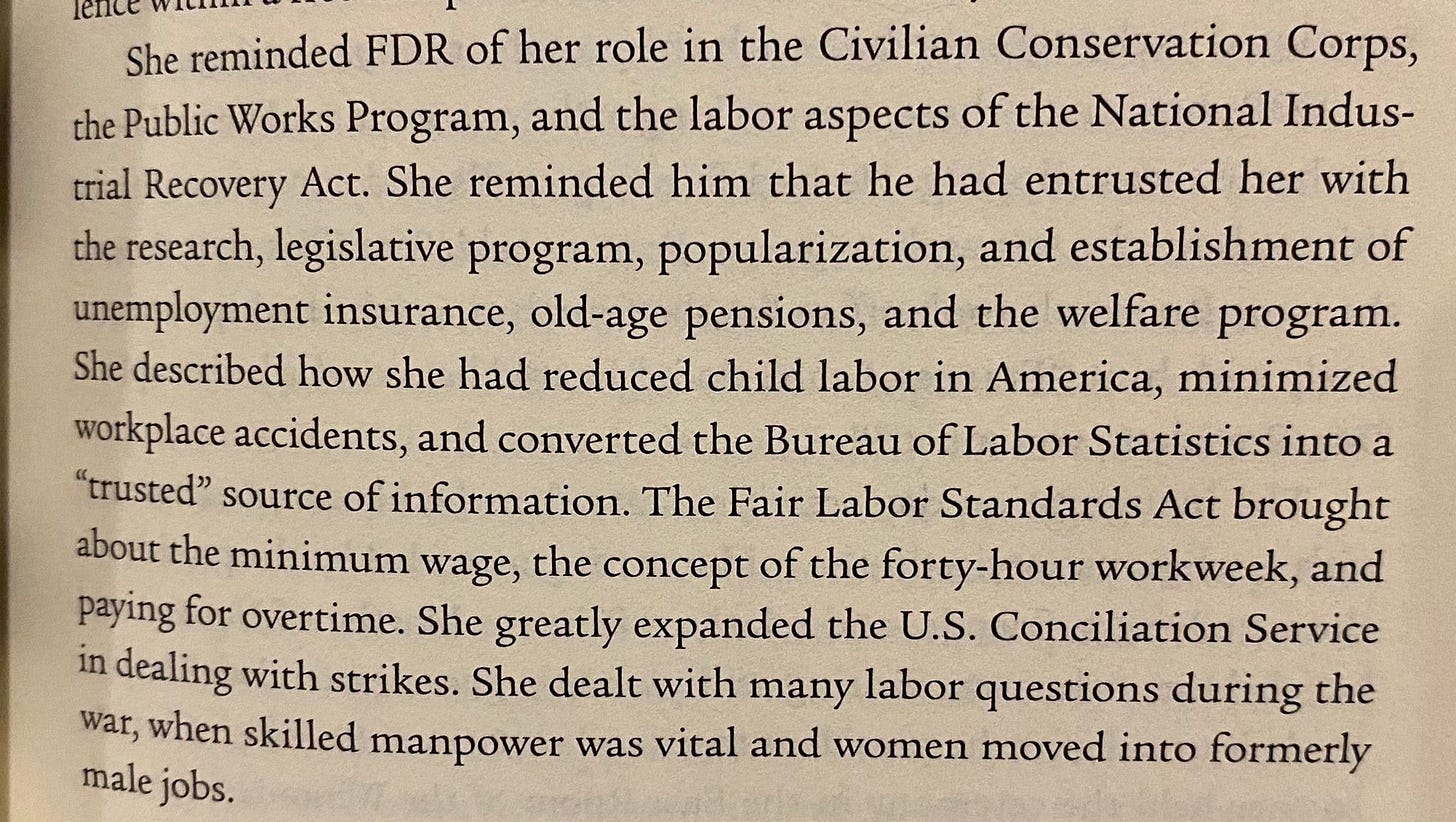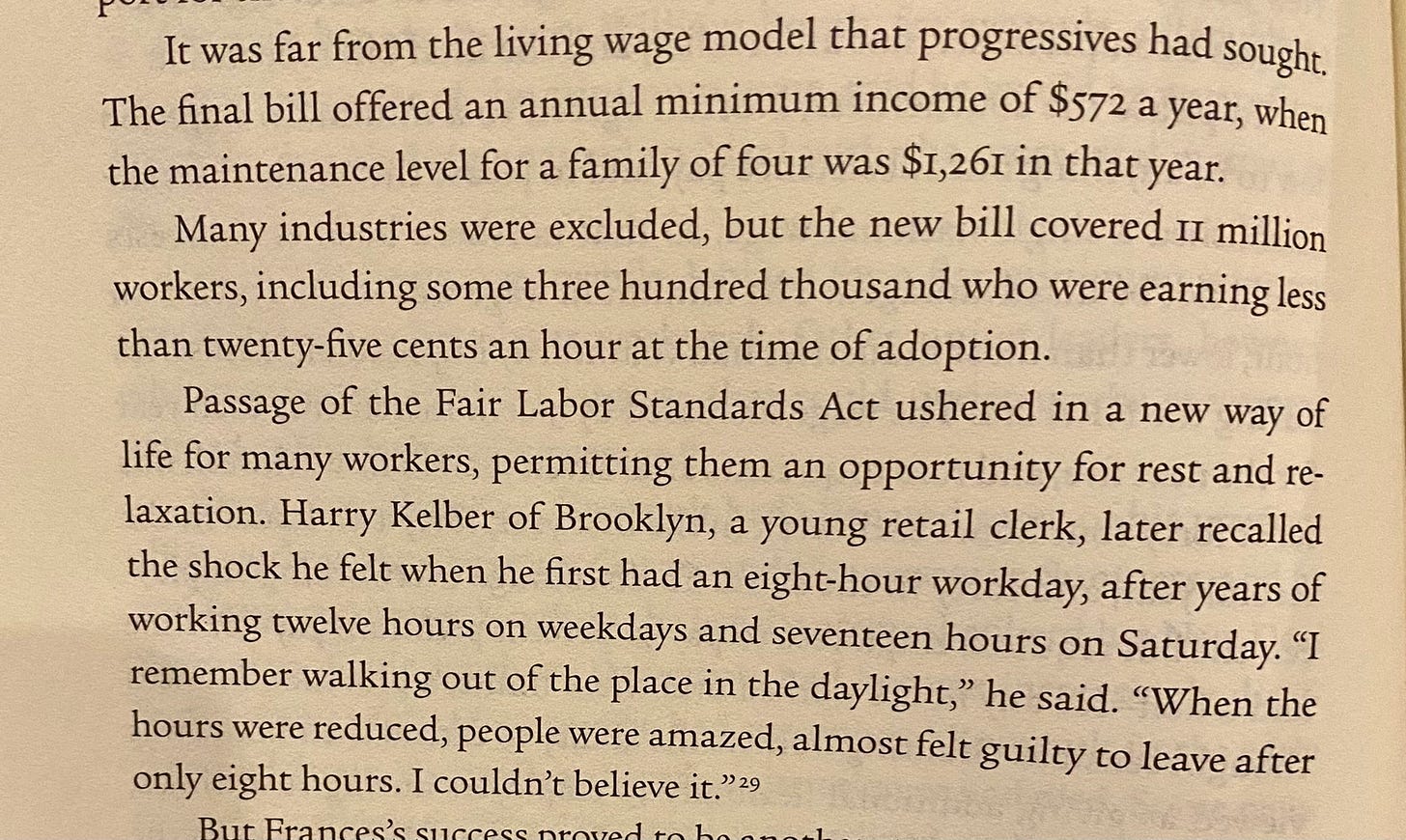What would Frances Perkins do?
With the anniversary of the Inflation Reduction Act, comparisons of President Biden to F.D.R. and his legislation to the New Deal. But there's something missing: the programs for people.

All the hoopla this week about the first anniversary of the Inflation Reduction Act is understandable. It included the first meaningful effort on climate change, among other things. But there was another anniversary: the 88th anniversary of the Social Security Act. It and other protections were important parts of the New Deal.
Comparisons of Biden and his legislation to F.D.R. and the New Deal are a stretch without stronger social safety and greater investment in people. That was core to the New Deal and F.D.R.’s legacy overall. Biden’s agenda had included such programs, but they were not enacted. And we have no anniversary to celebrate for them.
Today’s post concerns Frances Perkins, the force behind the Social Security Act and other major worker protections during F.D.R.’s presidency. Transformational change. She served as the Secretary of Labor through F.D.R.’s four terms. Here’s what she accomplished:
It’s mind-blowing. It didn’t pass all at once, and there were major setbacks along the way. Sound familiar? As an encouragement and some history, I thought advice one might take from Perkin’s life would be helpful.
The excerpts are from The Woman Behind the New Deal,” an excellent book!
1. Know what you want and go for it.
When F.D.R. initially asked Perkins to serve as his Secretary of Labor, she said no. But F.D.R. insisted. So Perkins gave him a list of programs and said she would only take the job if he accepted them. He did.
If you compare the above, you will see that Perkins achieved all her initial list for F.D.R. except for health insurance. Can you imagine?
2. Compromise and politics are inevitable.
Labor standards were central to Perkins’s mission. She put forward a proposal to address everything from child labor laws to a minimum wage.
That version of the proposal did not fly. Note Perkins was in favor of regional differences in the wage. But policy hit politics. But F.D.R. kept pushing, and a minimum wage did pass.
Compromises on unemployment insurance were notable too. Domestic and farm workers were excluded from the Social Security Act, Those jobs are largely held by Black and Hispanic workers, so blatant racism was added to get it passed. It is a question to think about today. Don’t let the perfect be the enemy of the good is one thing. What about when it’s a bad thing? The programs Perkins pushed for largely got better over time. And there’s always more to do.
It’s hard to wrap one’s mind around how much transformational change we see on her watch. Who’s the Frances Perkins of today?
3. Statistics represent real people.
We can thank Perkins, too, for setting the Bureau of Labor Statistics on the path to becoming a professional and not a political agency. (There had been scandals during the Hoover administration about the data.) Above all, it was important to her that we remember statistics represent real people.
So, thank Perkins for #JobsDay worth getting out of bed for. And when you rattle off numbers (hi, fellow macroeconomists), think of what they mean.
4. Know the critics and shut down frivolous complaints.
Perkins was the first woman to serve as a presidential Cabinet member. That added a burden. One of her ways is to reduce it. She paid attention to how the men around her acted and adjusted her appearance not to draw attention away from what she was saying.
I understand that advice would be controversial today. Also, it didn’t entirely work. But there’s something to be said for choosing which battles to fight. She had plenty to fight that had nothing to do with her gender.
5. Don’t expect to walk away a hero.
Incredibly, after all her accomplishments, and likely because of them, Perkins was subject to a threat of impeachment and was publicly humiliated. And maybe worse, her legacy was largely forgotten. The programs stand.
Note some of that immigration was to help German Jews flee Europe. Immigration was highly unpopular during the Great Depression. She did it anyway.
In closing.
Looking back can often help you move forward.
As an economist, I have studied both Social Security and unemployment insurance. I had just heard of Frances Perkins when working with policy experts during the pandemic. It helped me understand why the programs are the way they are. Political compromises can cast a long shadow—ones to throw sunshine on.
Frances Perkins is awe-inspiring had incredible dedication.
Correction: The first version of the post said Perkins was 33 years old when starting as Secretary of Labor. She was 53.














This is the first I'm hearing of her and no I don't think there is anyone out there today like her. And yes, we need to look out after Social Security now more than ever. Let's not forget, SS can never run out of money no matter what politician or an economist says. There are people in favor of privatizing it and that would be a disaster for working class Americans. Safety nets need protection again now more than ever and that includes unemployment insurance. A must article here.
"I had just heard of Frances Perkins when working with policy experts during the pandemic. It helped me understand why the programs are the way they are. Political compromises can cast a long shadow—ones to throw sunshine on. ... Frances Perkin is awe-inspiring had incredible dedication."
BTW, did she and Sadie T.M. Alexander knew one another?